Iranian Regime Blocks Page Of Actress, Wife Of Football Player
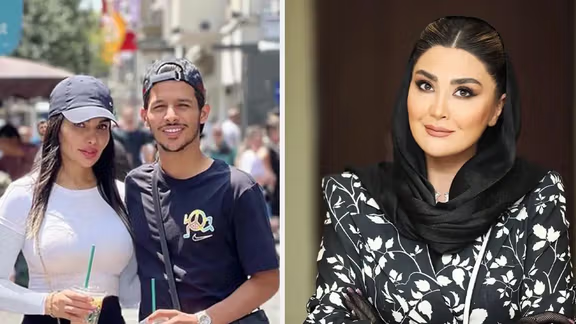
The Instagram accounts of Iranian actress Maryam Masoumi and Setareh Masoumi, the wife of football player Mehdi Ghayedi, have been blocked due to the publication of photos without hijab.

The Instagram accounts of Iranian actress Maryam Masoumi and Setareh Masoumi, the wife of football player Mehdi Ghayedi, have been blocked due to the publication of photos without hijab.
Maryam Masoumi's account, boasting one million and 300 thousand followers, and Setareh Masoumi's account, with 578 thousand followers, were both affected by the suspension.
On Maryam Masoumi's page, a photo with a caption said, "This page has been suspended on the order of the judicial authorities by the Public Security Police."
Similarly, a photo on Setareh Masoumi's page conveyed that the page was blocked "according to the order of the judicial authorities, due to the publication of criminal content."
The blocking occurred while Mehdi Ghayedi and his spouse are currently residing in Dubai. The key issue revolves around how these accounts were blocked without gaining access to Instagram's internal system. While the exact details remain uncertain, the most plausible scenario is that the account owners were requested to provide their passwords, following which the accounts were blocked.
In response to the incident, Fars News Agency, affiliated with the Revolutionary Guards, reported on Monday that the reason for Maryam Masoumi's page suspension was attributed to "the young actress's use of images with inappropriate clothing."
The development is part of a broader trend where many Iranian women, including notable figures, consistently share photos without mandatory hijab on social networks.
The police, particularly after the Woman, Life, Freedom protests have taken measures to curtail the activities of individuals who defy mandatory hijab, leading to detentions in some cases.

Prices for essential food items continued to grow in Iran last month, with red meat registering an 82-percent jump compared to the same month one year ago.
The galloping inflation report published by the Statistical Center of Iran (SCI), a government outfit, comes after warnings last week that a $14 billion government outlay for importing food and medicine next year will be insufficient to address needs.
In Iran’s closed economic system importers have no direct access to foreign currencies and can only receive US dollars or euros from the government. Local media have pointed out that $14 billion proposed in next year’s budget for food and medicine would only be enough for importing essential food such as grains and protein sources but cannot also pay for medicine.
According to the SCI report, other food items also experienced serious inflation. Prices of fish increased by 72 percent compared with prices in October-November 2022. Overall, the point-to-point inflation rate for a basket of essential daily needs was almost 40 percent.
Other recent reports have put the inflation rate at more than 50 percent. Also, overall inflation for retail food prices was reported to be 37 percent.
Despite higher oil exports this year, the Iranian government seems unable to lower inflation and its restrictive foreign currency policies continue. The national currency rial, still hovers around its all-time low of 500,000 per US dollar, a 12-fold fall in value since early 2018 when the United States withdrew from the JCPOA nuclear deal and imposed economic sanctions on Iran.
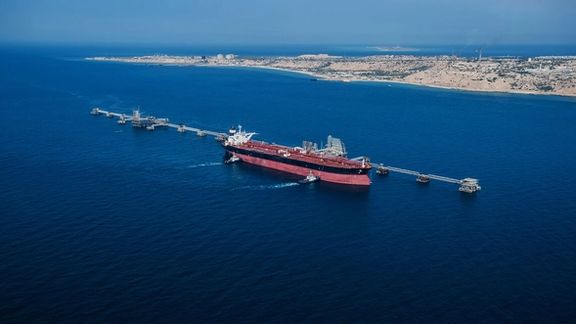
The exact amount of oil revenues is a state secret, but it is believed Iran is selling Cina around 1.1 million barrels of oil per day, with large discounts. Experts estimate that with the discount, and additional costs related to the illicit shipments of oil, Iran is probably receiving around $50 per barrel, which would mean $21 billion of income per year, hardly enough to finance the food imports and other needs. Other Iranian oil shipments to Venezuela or Syria hardly return any hard currency to Tehran’s coffers.
This is why next year’s draft budget bill presented to parliament has increased taxes to deal with persistent deficits.
The government has projected a 50-percent increase in taxes of various kind compared to the current budget. Total expected tax revenues will reach over 11,220 billion rials ($22.44 billion), Jahan-e-Sanat said. This would be equal or greater than the annual oil income.
The total government budget will reach 24,620 billion rials ($49.2 billion) next year, which shows an increase of 18.2 percent compared to this year’s budget, the report added. That is to say, the tax revenues will account for more than 45 percent of the Iranian government’s operating budget.
The inflation rate in Iran has stayed at or above 40 percent for at least three years, increasing political instability. After last year’s anti-government unrest, more economic protests are taking pace in recent weeks. Workers in different sectors and retires of state enterprises stage daily protests demanding higher pay, as millions of previously middle-class people are now considered poor. Next years budget, forecasts a 16-percent pay increase for workers, less than half of the current rate of inflation.
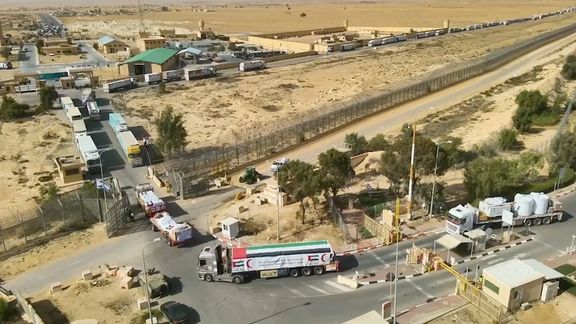
As the temporary ceasefire between Israel and Hamas enters its final day, the militant group is actively seeking an extension.
The ceasefire, initiated on Friday, has resulted in the release of dozens of hostages, with over 100 Palestinian prisoners held on terror charges freed by Israel as part of the agreement.
Hamas is pushing for an extended truce, to give the group time to regroup amidst the devastation inflicted by Israel's relentless retaliation for its massacre of October 7. The designated terror group killed 1,200 mostly civilians and took 240 or more hostage in Gaza.
However, in spite of the fact that over 14,000 Gazans have been killed, including top Hamas commanders, and half of the strip now turned to rubble, Ali Fadavi, the deputy commander of the Islamic Revolutionary Guard Corps (IRGC), asserted on Monday that the Israeli military's perceived invincibility has diminished.
"The invincible image that Israelis had portrayed for military dominance collapsed," he said. "Several hundred individuals breached its seemingly impregnable walls, penetrating tens of kilometers into occupied Palestine."
Israeli Prime Minister Benjamin Netanyahu, addressing his forces in Gaza, conveyed a resolute stance on Sunday, stating that once hostages are released, "Nothing will stop us." He said while the hostage release continues, he would agree to one additional day for every 10 captives released but vowed to continue the war until Hamas is eradicated from the strip.
While Iran takes credit for supporting Hamas financially and militarily over the past two decades, it has refrained from direct military involvement in the current conflict. Instead, its proxies have taken the front line. Even amidst the ceasefire, Lebanese Hezbollah has continued its aggression on Israel's northern border and Yemen's Houthis have taken further actions on vessels in the Red Sea.

Religious prisoner Ayub Karimi was moved to solitary confinement last week in preparation for imminent execution in Ghezel-Hesar Prison in Karaj.
The prisoner, a SUnni Kurd, is the latest case rights groups fear will be victim to Iranian crackdowns on dissenting voices among the country's minorities.
According to Hengaw Organization for Human Rights, one week ago, the Kurdish religious prisoner, the father of two children, was taken to the solitary confinement wing.
It follows the execution on November 5 of fellow religious prisoner Ghasem Abesteh, one of Karimi's co-defendants.
Hengaw said that along with Karimi, five more religious prisoners have been identified as also facing imminent execution, Davoud Abdollahi, Farhad Salimi, Anwar Khezri, Khosrow Besharat, and Kamran Sheykha.
All of them were taken into custody in 2009 and were transferred to the detention center of the intelligence agency in Urmia (Orumiyeh) City.
They were tried in 2015, and subsequently sentenced to death. These sentences were confirmed by the Supreme Court in 2020, after years of legal battles. Despite a request for retrial in September 2020, the Supreme Court rejected their plea.
The charges against them include "War against God," "corruption on earth," "support for Salafi groups," and the alleged "murder" of Abdolrahim Tina, who was killed by unidentified assailants in September 2008. However, in letters published by human rights organizations in recent years, the accused individuals consistently denied any involvement in these accusations.
In July alone, Kurdistan Human Rights Network reported that in the past month, Iranian security forces detained at least 54 Kurdish activists and citizens in the western provinces of Iran. Two detainees were sent to prison while the fate of the rest, including two children, remains unknown.
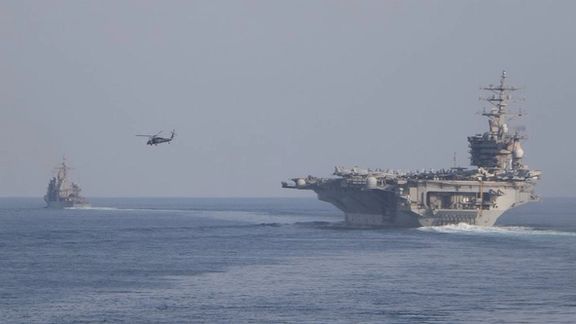
The United States on Sunday deployed its Dwight D. Eisenhower aircraft carrier task force to the Persian Gulf amid continuing tensions in the Middle East.
The US military announced that the Carrier Strike Group Eisenhower (IKECSG) completed a transit of the Strait of Hormuz to enter the waters of the Persian Gulf to support US Central Command missions.
Following the October 7 terror attack on Israel by Hamas and the start of the Gaza war, the US first deployed two strike groups to eastern Mediterranean in what appeared as a deterrence against the Lebanese Hezbollah. The Shiite militant group is believed to possess tens of thousands of missiles and rockets that could bring destruction to Israel. The Hezbollah has since engaged in limited border skirmishes but has avoided a full-scale war with Israel.
Iran’s regime has also chosen not to directly get involved in the Gaza war, although officials issue daily statements of support for Hamas.
The US said that the IKECSG are patrolling the Persian to ensure freedom of navigation in key international waterways while supporting CENTCOM requirements throughout the region.
Iranian officials periodically threaten to close off the Strait of Hormuz or inspect vessels. They have attacked and harassed dozens of commercial vessels in the region since 2019.
“The aircraft carrier USS Dwight D. Eisenhower was accompanied by the guided-missile cruiser USS Philippine Sea, guided-missile destroyers USS Gravely and the USS Stethem and the French frigate Languedo,” the USCENTCOM said.
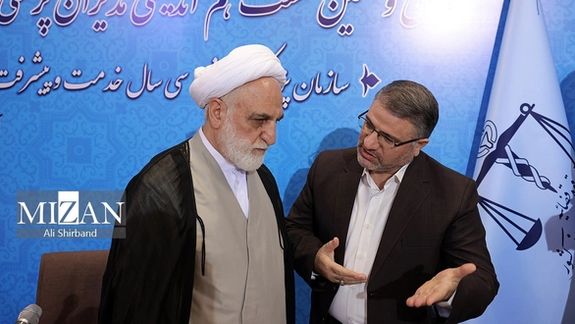
A political prisoner has called on Iran's chief justice to investigate his revelation that dissident rapper Saman Seydi (Yasin) was subjected to mock execution.
In an open letter addressed to Chief Justice Gholamreza Mohseni-Ejei Thursday, Ahmadreza Haeri has offered more details about the mock execution of a former fellow inmate Yasin, at Ward 240 of Tehran’s Evin Prison.
Yasin whose death sentence was overturned by the Supreme Court in December, in audio files smuggled from prison, has described severe torture including a mock execution during which he was forced to stand on a chair with a noose around his neck after being told to write his last will and testament.
“He is young. One must show mercy. Try to place the noose sideways so that his neck breaks right away when he drops so he doesn’t suffer too much,” Yasin says one of his supposed executioners said to the other.
Then, he says, there was a call after which he was told the execution had been delayed giving him “another chance to cooperate”. Two days later, a real death sentence was handed to him. His wife miscarried her eight-month baby after finding out about the death sentence.
Yasin (27) belongs to the persecuted Kurdish Yarsan religious community and was a vocal critic of the regime before his arrest for supporting the anti-government protests known as the Woman, Life, Freedom movement. He has only attended the court once during his fourteen months of imprisonment and does not have access to his lawyer.

“Form a fact-finding committee consisting of independent lawyers and judges to investigate this matter and allow independent journalists and reports to monitor the committee’s performance,” Haeri wrote.
Haeri alleges that Yasin was taken from his cell in the middle of night and subjected to a mock execution to force him to accept fabricated charges including the use of a combat weapon during last year’s anti-government protests, which would justify a death sentence sought by the prosecutor against him.
According to Haeri, tens of other prisoners heard Yasin’s account of the torture and mock execution he had undergone when he was taken back to the general ward, mentally and physically shattered.
Haeri, a lawyer and human rights activist, is serving a sentence at Ghezel Hesar Prison for exposing the beating of other prisoners at Tehran’s infamous Fashafouyeh Prison in 2014, which led to the death of two inmates, during an incident which came to be known as “Black Thursday”.
State-affiliated media such as the Revolutionary Guards (IRGC) linked Tasnim news agency claimed Wednesday that a new case has been opened against Haeri for not being able to provide proof for the claim in his letter earlier this week that Yasin was subjected to mock execution.
Many other political prisoners and prisoners of conscience have claimed that they were subjected to mock executions to extract confessions that would justify harsh sentences including Sahand Noor-Mohammad-Zadeh, 26, an anti-government protester.
He was accused of setting a trash bin on fire and blocking traffic, both of which he denied. But he had several times been blindfolded and told to climb a chair to be hanged before his trial. He was sentenced to death for moharebeh (enmity against God) and was executed on November 2 last year.
Another protester, Majid Kazemi, said he had undergone mock executions at least fifteen times, in addition to other tortures including upside down suspension and showing him a video of his brother being tortured to “confess” to whatever was dictated to him. Kazemi was also executed on May 19 for “enmity against God”.
In a statement on November 23, the US State Department condemned mock executions and torture of prisoners in Iran with the hashtag #SamanYasin and called on the Iranian authorities to immediately stop “these inhumane practices and conduct fair and transparent trials for their citizens.”